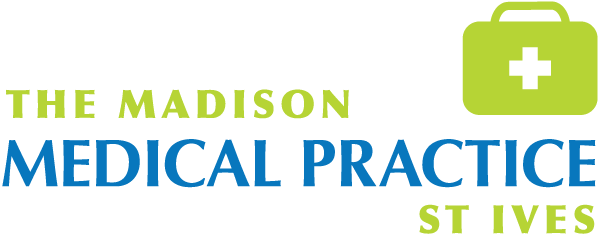Polycystic ovary syndrome (PCOS)
as discussed by Dr Lina Channo consulting GP at the Madison Medical Practice St Ives
Polycystic ovarian syndrome (PCOS) is the most common hormonal disorder in women of reproductive age (between late adolescence and menopause). It is associated with problems such as irregular menstrual cycles, excessive facial and body hair growth and much more. It affects 8-13% of women in this age group and up to 70% of these cases remain undiagnosed.
Women with PCOS have high levels of insulin that don’t work effectively, or male hormones known as androgens, or both.
The exact cause of PCOS is unknown, however genetics, hormones and lifestyle factors play a role in developing PCOS. Women who have a family member (mother, aunt, sister, and daughter) with PCOS are 50% more likely to develop it. The prevalence is higher for women of Asian, African, and Aboriginal and Torres Strait Islander background.
Women may present with a wide range of symptoms such as:
- Irregular menstrual cycles- due to less frequent ovulation (release of eggs), periods may be less, more often or no periods. In some young girls, PCOS is the cause of periods failing to start
- Excessive facial and body hair
- Scalp hair loss
- Acne on face and body
- Weight gain and trouble losing weight
- Reduced fertility (difficulty falling pregnant)
- Emotional challenges including anxiety, depression, low self-esteem, poor body image and eating disorder
Additionally, women with PCOS are at higher risk of developing obesity, insulin resistance, type 2 diabetes, high cholesterol, heart disease, endometrial cancer, and sleep apnoea.
Therefore, its essential for women to seek medical advice and see their doctor if they suspect they have PCOS. The doctor will take medical history, conduct a physical examination and request a blood test and pelvic ultrasound.
To be diagnosed with PCOS, woman need to have two out of three of the following:
- Periods that are irregular (more or less frequent than monthly)
- Symptoms such as acne, an increase hair growth (face and body) or blood tests that show higher levels of androgen hormones
- Ultrasound of ovaries (showing more than 20 follicles), however ultrasound is not recommended for women aged under 20
PCOS is a chronic condition and cannot be cured. However, by seeking medical advice, obtaining the correct information, and appropriate treatment, it can be improved.
The mainstay of the management is lifestyle modification and weight reduction – losing 5-10% of body weight is essential. This can be achieved by increasing physical activity levels and eating a healthy and well-balanced diet.
Medical treatments of PCOS include:
- The oral contraceptive pill – this is often prescribed for contraception, to regulate the menstrual cycle and reduce excess hair growth and acne
- Insulin sensitising medication – these will reduce insulin resistance, may regulate periods and improve ovulation and fertility. This can also prevent the progression to diabetes and assist in weight loss
- Excess hair growth can be managed by waxing/laser hair removal/electrolysis. Additionally, medication to block androgens (for example, spironolactone) may be used to reduce excess hair growth or scalp hair loss
- Psychological counselling is often required to deal with the emotional impact of PCOS
A team of health professionals such as GPs, Endocrinologists, Gynaecologists, Dietitians, Exercise Physiologists and Psychologists need to work together to achieve the best health outcome.
If you suspect that you may have PCOS, contact the Madison Medical Practice St Ives for an assessment and further management.
